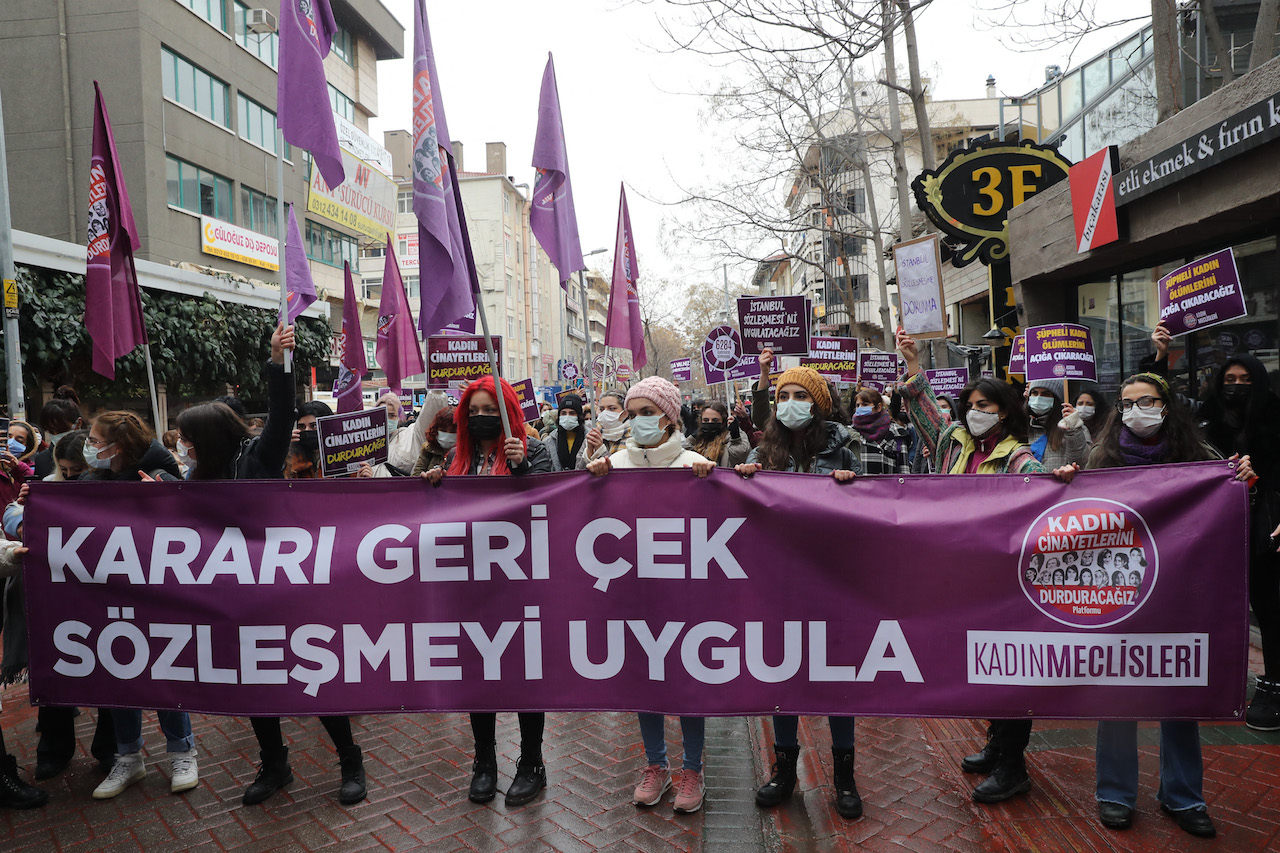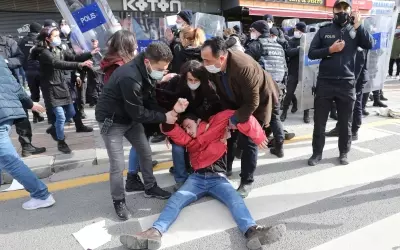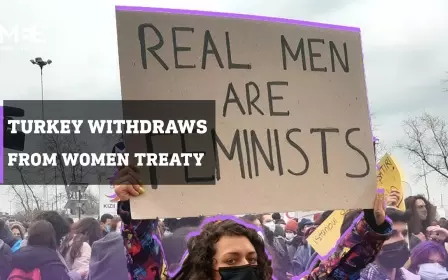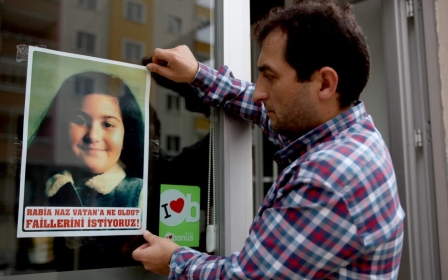Turkey's withdrawal from women's rights treaty sparks domestic backlash
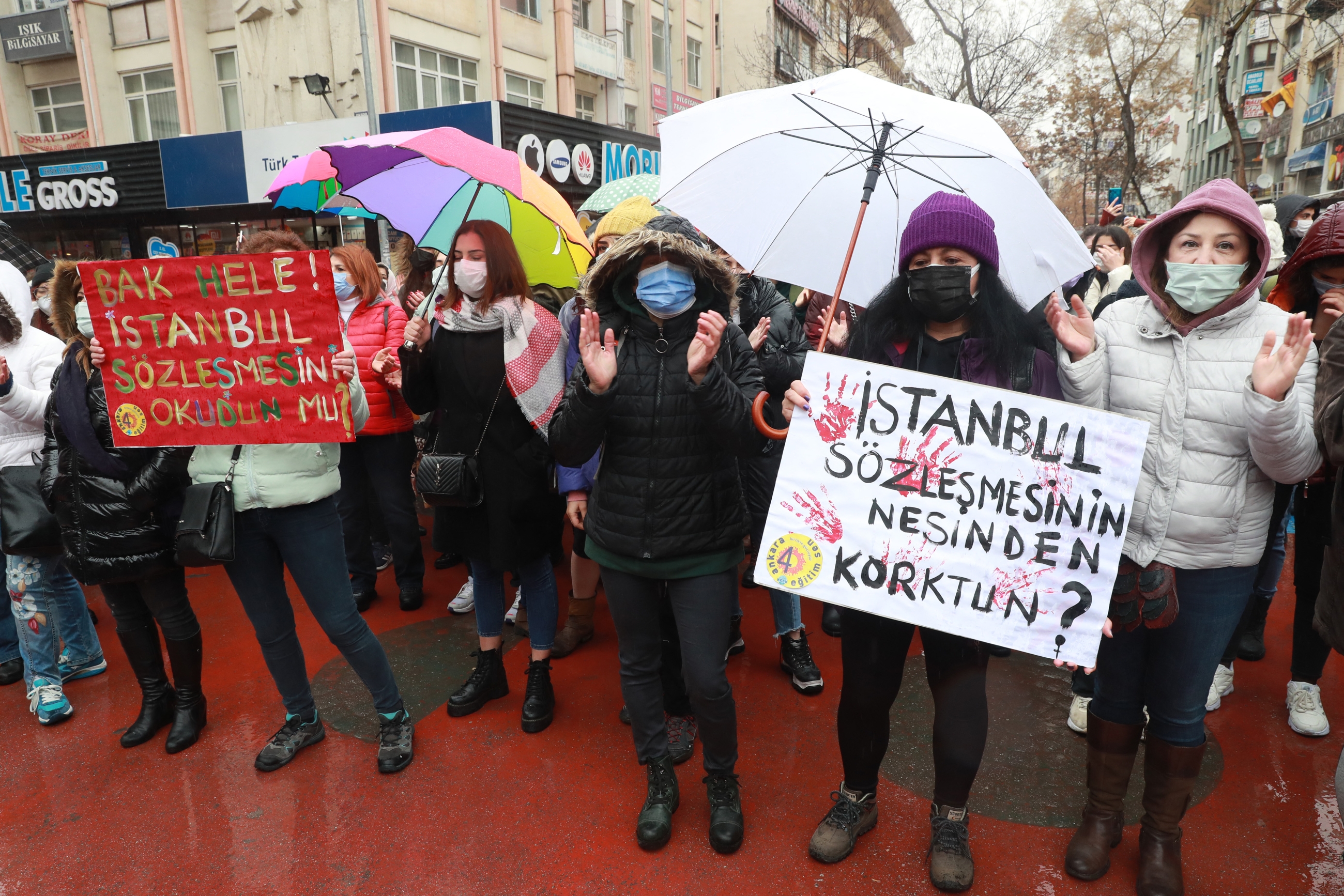
Turkey's decision to withdraw from the Istanbul Convention on the prevention of violence against women came as a shock to many, despite several years of agitation by the government and its allies.
The move came without warning overnight on 20 March, startling politicians and women's rights activists in the country who believed the issue had at least temporarily been kicked into the long grass.
Conservatives in the country had long argued that the Istanbul Convention, to which Turkey was the first signatory in 2011, undermined the nuclear family and was too supportive of LGBT rights.
'We are now debating the different resistance strategies that we will put into action against this move. Suing this decision at the domestic courts is one of them'
- Elif Ege, Mor Cati
In a statement justifying the withdrawal, the government's communications directorate said the convention had been "hijacked by a group of people attempting to normalise homosexuality", which it claimed was incompatible with Turkey's "social and family values".
Deniz Altintas, a member of the We Will Stop Femicides Platform, told Middle East Eye that the women's movement had already achieved "important gains through organised, collective and political struggle" in Turkey.
"The attacks against women and LGBTIQ+ people related to the Istanbul Convention rose last summer," she said.
"When the women and LGBTIQ+ people took to the streets, these attacks were pulled back."
"Now we continue our struggle in all parts of Turkey and also abroad for the withdrawal of the last decision on the Istanbul Convention," she explained.
"In our struggle, we always say to women and LGBTIQ+ people: you will never walk alone."
The fear among LGBT and women's rights activists is that the withdrawal will normalise violence against sexual minorities and women, particularly as seemingly each week a new story emerges about the murder of a woman in the country.
Right-wingers in Turkey have already begun eyeing up new targets.
Abdurrahman Dilipak, a columnist for the far-right pro-government Yeni Akit newspaper, argued on 21 March that the next step should be withdrawal from the UN's Committee on the Elimination of Discrimination against Women (CEDAW) followed by the Lanzarote Convention, which protects children against sexual abuse and exploitation.
Elif Ege, a volunteer for Mor Cati - an organisation that has tackled violence against women since 1990 and is a member of the Istanbul Convention Monitoring Platform - told MEE they were now looking at ways of pushing backing on the decision, including legal options.
"We are now debating the different resistance strategies that we will put into action against this move. Suing this decision at the domestic courts is one of them," she said.
"We will also continue to work on demonstrating the effects of the withdrawal attempt on women’s lives, to pressure the government at the domestic and the international arena through our activist and advocacy work."
A 'violation of human rights'
It all marks a stark contrast to 2011, when Recep Tayyip Erdogan, then prime minister, hailed Turkey's achievement in establishing the Istanbul Convention.
"Violence against women is now a 'violation of human rights'," he tweeted at the time.
"The convention was prepared under the leadership of Turkey."
The government has continued to claim, despite its opposition to the convention, that it will continue to protect the rights of women in the country. It regularly cites the existence of Law 6284 to Protect the Family and Prevent Violence against Woman, which was passed in 2012.
'They are trying to build an image of an LGBTI people who are against all the national and family and religious values of Turkey … this was another step'
- Yildiz Tar, LGBT activist
The concerns they now cite with regards to the Istanbul Convention - despite the text being the same as it was when it was originally passed - stem from the references to preventing discrimination on the basis of "sexual orientation" and the reference to gender as being "socially constructed".
LGBT activists see the withdrawal as, in part at least, a culmination of years of increasing homophobic rhetoric and legislation by the government.
"They are trying to impose an anti-LGBTI agenda on society. It is not the case that there is a huge societal group that is against LGBTI people, but rather the government, political parties and media that are sponsored by the government are always targeting LGBTI people," said Yildiz Tar, an activist involved with the Ankara-based LGBT rights organisation Kaos GL.
They told MEE that while the sudden overnight announcement of the withdrawal had come as a shock, it was also an unsurprising result after a year that saw a culture war over LGBT rights emerge in the country, particularly with regards to the protests at Bogazici University and the controversy over Religious Affairs Director Ali Erbas' assertion that homosexuality brought "illnesses and decay".
Tar added that Kaos GL and other organisations were still working out a response to the latest development.
"They are trying to build an image of an LGBTI people who are against all the national and family and religious values of Turkey … this was another step," they explained.
Splits in pro-government circles
The argument over the validity of the convention has provoked some discord within government-supporting circles as well.
Most notably, the Women and Democracy Association (KADEM), a pro-government women's rights organisation co-founded by Erdogan's daughter Sumeyye Erdogan Bayraktar, openly supported the convention despite their concerns about its pro-LGBT elements.
Following the government's withdrawal from the convention, KADEM issued a short statement saying it would have preferred to reform the convention through discussion in the Council of Europe.
It said the convention had been turned into a point of "social tension" in the country and that the withdrawal had happened in this context.
"As KADEM, we will be a persistent follower of our achievements in the general women's rights struggle with the slogan of 'Equality in Existence, Justice in Responsibility', as before. We declare to the public that we will work with all our might in order to further strengthen Law 6284 and to eliminate the problems in the applications," said the statement.
MEE contacted KADEM for a comment, but had not received a response at the time of publication.
'The society is not that closed'
On the same day as Turkey withdrew from the Istanbul Convention, media reported the killing of four women across the country, allegedly by their romantic partners.
We Will Stop Femicide reported that 300 women were murdered by men in 2020, while a further 171 died in suspicious circumstances.
Overwhelmingly, these killings took place inside their homes and were carried out by husbands, ex-husbands or partners.
Ege said there was a need for systemic social change when it came to how women were treated in Turkey.
"Issues such as these and many others have been perpetuated with the idea that women belong to families and they should not pursue a free and equal life without any form of violence outside of the families," she explained.
She said the attacks against the Istanbul Convention stemmed from its support of the core idea that "male violence against women derives from gender inequality" rather than simply from a lack of education or legal protection.
"We now know that this mentality that opposes gender equality will penetrate each and every institution more and more and will make it harder for women to be able to escape from violence."
In recent years there has been a major growth in the number of activists and campaign groups in Turkey focusing on women's rights, LGBTI rights and the rights of other minorities. Surveys suggest an increasing minority in Turkey (particularly among younger demographics) regard homosexuality as acceptable, even if the country as a whole is largely still unsupportive.
Since the announcement of the withdrawal from the Istanbul Convention, groups such as the Women's Councils and We Will Stop Femicide have staged demonstrations across the country in opposition, while numerous celebrities, politicians - including the mayor of Istanbul - and ordinary people have spoken out against the move in public and on social media.
Tar said that, in their experience, Turkey was overall not as rigidly conservative as many believed.
"The society is not that closed, like the minds of the government, and there is a change towards a more equal place - everyone knows that if you discriminate against someone, if there is violence, if there are inequalities, it directly threatens the peace of that society, it threatens everyone," they said.
"For all these hate attacks we have seen on social media, always lots of people are just directly ‘no you cannot do that'. And from my observation, the other rights movements are day by day having more knowledge on the issue and getting more into LGBTI rights and that is hopeful."
This article is available in French on Middle East Eye French edition.
Middle East Eye propose une couverture et une analyse indépendantes et incomparables du Moyen-Orient, de l’Afrique du Nord et d’autres régions du monde. Pour en savoir plus sur la reprise de ce contenu et les frais qui s’appliquent, veuillez remplir ce formulaire [en anglais]. Pour en savoir plus sur MEE, cliquez ici [en anglais].


